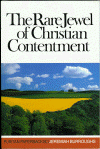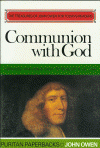|
Jeremiah Burroughs
1599-1646 
|
"Christian contentment is that sweet, inward, quiet, gracious frame of
spirit, which freely submits to and delights in God's wise and fatherly
disposal in every condition."
Jeremiah Burroughs, in characteristic Puritan style, analyzes his subject deeply and thoroughly, as if seeking to squeeze the last drop of sweetness from a delectable fruit. I found the second, third and fourth chapters to be especiallydelightful—here, Burroughs considers the great mystery of contentment, expressed in a multitude of ironies: 1) The contented Christian is, at the same time,the most contented man in the world, and also the most unsatisfied man. 2) A Christian comes to contentment, not so much by way of addition, as by way of subtraction.3) A Christian comes to contentment, not so much by getting rid of the burden that is on him, as by adding another burden to himself. 4) It is not so much theremoving of the affliction that is upon us as the changing of the affliction, the metamorphosing of the affliction, so that it is quite turned and changed into something else. mean in regard of the use of it, though for the thing itself the affliction remains. ... and so forth. There is much wise and practical teaching in this book that will prove helpful to every reader who takes it to heart. Highly recommended! |
|
John Flavel
1630-1691 
|
"The greatness of God is a glorious and unsearchable mystery. ... The
condescension of the most high God to men is also a profound mystery. ... But
when both these meet together, as they do in this Scripture, they make up
amatchless mystery. Here we find the most high God performing all things for a
poor distressed creature."
Flavel examines the subject of divine providence in very practical terms, seeking to make us aware of God's involvement in the various circumstances and events of our lives—our birth and upbringing, our conversion, our employment,matters, in preserving us from evil, and in sanctifying us. In the second section of the book, he discusses the discipline of meditating upon the providence of God—that it is our duty, how to meditate upon it, and the advantagesof meditating on God's providence. In the third and final section, he considers the practical application of the doctrine and answers some practical problems. This book helps us to see how God faithfully cares for us daily throughout our lives, in every aspect of life, and evokes from us the wonder and gratitude that He so fully deserves. Highly recommended! |
|
John Owen
1616-1683 
|
"Our communion with God lies in his giving himself to us and our giving
ourselves and all that he requires to him. This communion with God flows from
that union which is in Christ Jesus."
Owen regards communion with God as the great joy and reward of becoming Christians. The early Christians were persecuted mercilessly and treated as the filth of the world. Why, then, would anyone wish to become a Christian?Owen cites the apostle John as answering this question "truly, our fellowship is with the Father and with his Son Jesus Christ." Owen examines our communion with God as it relates to all three members of the Holy Trinity. Several of his chapters are devoted to the excellency of Christ, and others examine various aspects of our communion with Christ—inpurchased grace, in acceptance with God, in holiness and in privileges. Throughout the book, he includes chapters that consider the consequences of the teaching he presented in the previous chapters. The Banner of Truth edition has been rewritten by Dr. R. J. K. Law to make it easier to read. The end result is well written, easy to understand, and displays the warmth and devotion of Owen's spirit.This is definitely a valuable resource for drawing closer to God. Highly recommended! |
An Exposition of Romans 8:28
|
Thomas Watson
d.1689 
|
"There are two things, which I have always looked upon as difficult. The
one is, to make the wicked sad; the other is, to make the godly joyful.
Dejection in the godly arises from a double spring:either because their inward
comforts are darkened, or their outward comforts are disturbed. To cure both
these troubles, I have put forth this ensuing piece, hoping, by the blessing of
God, it will buoy uptheir desponding hearts, and make them look with a more
pleasant aspect. I would prescribe them to take, now and then, a little of
this Cordial: ALL THINGS WORK TOGETHER FOR GOODTO THEM THAT LOVE GOD. To know
that nothing hurts the godly, is a matter of comfort; but to be assured that
ALL things which fall out shall co-operate for their good, that their crosses
shallbe turned into blessings, that showers of affliction water the withering
root of their grace and make it flourish more; this may fill their hearts with
joy till they run over."
Unless you are an avid reader of the Puritans, you have likely never read such an in-depth study of Romans 8:28.In classic Puritan style, Watson examines every phrase and every aspect of the verse and its teaching, probing the depths with great insight and wisdom. Highly recommended! |